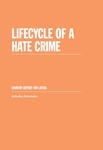Lifecycle of a hate crime. Country report for Latvia
The following work presents, in detail, the findings of in-depth primary and secondary research conducted over two years tracing the Lifecycle of a Hate Crime in selected EU Member States. The research was undertaken in five jurisdictions within the EU - Ireland, England and Wales, Latvia, the Czech Republic and Sweden in which contrasting approaches to the prosecution and punishment of hate crime are evident.
Recent years have seen positive, but at the same time insufficient developments in combatting and preventing hate crimes in Latvia. Changes have predominantly taken place in the legislation, largely as a result of Latvia’s international obligations. In Latvia, much attention is paid to the incitement of hatred issues, particularly on the Internet, which have also been impacted by different foreign and domestic political events, such as the conflict in Eastern Ukraine, migration, etc. while public information about hate crimes is rare.
The 2014 Criminal Law amendments which envisage criminal liability for incitement to social hatred on grounds of gender, age, disability and other characteristics, should be generally viewed positively as they expand the protection of vulnerable groups against hate crimes and hate speech. Although the list of protected characteristics is open, nevertheless, the legislator by explicitly naming a characteristic or a specific group sends a signal that manifestations of hatred against the group are unacceptable in Latvia. Despite the surveys in Latvia and wider European Union, which indicate high levels of homophobia in Latvia, there was insufficient political commitment by the parliament to include sexual orientation among protected characteristics.
While racist motive was made aggravating circumstance already in 2006, and “national, ethnic and religious motive” was added in 2014, allegedly to bring the Latvian legislation in line with Article 4 of Framework Decision 2008/913/JH on combatting certain forms and expression of racism and xenophobia by means of criminal law, this provision has never been applied in practice. Thus, the transposition can be considered as formal as some of the leading criminal law experts have not been able to provide sufficient clarification for its application.
Training of police officers to identify and investigate hate crimes has increased. The signing of an agreement between the OSCE/ODIHR and the State Police in Latvia in December 2014, trainings organized in co-operation with the State Police College and NGOs, as well as the guidelines on hate crime identification and investigation issued by the State Police in August 2018, are welcome developments. However, the training of the representatives of law enforcement bodies and judicial bodies is irregular and not systematic.
Official data about hate crimes and incitement to hatred cases are limited, the number of opened criminal proceedings during the year remain small. Unofficial statistics compiled by NGOs, such as the Latvian Centre for Human Rights and the Association of LGBT and their friends “Mozaīka” indicate a higher number of crimes motivated by race, xenophobia and homophobia than those that come to the attention of national authorities. There remains very serious concern about the unwillingness of hate crime victims to report hate crimes to the law enforcement authorities.
Although the legislation provides for a significant range of victims’ rights which have also been expanded through the adoption of the EU’s Victims’ Rights, support to victims in practice remains inadequate. Latvia has no special support programmes for hate crime victims and overall, the country falls behind in general victim support structures and programmes compared with most EU Member States. For the first time, in 2015 the Latvian government granted state funding for social rehabilitation services to adult victims of all crimes.
The financial support by the government and selected municipalities to different civil society projects aimed at promoting tolerance and combatting hate crimes and hate speech has increased, nevertheless it remains small. This hinders NGOs from planning long-term and sustainable projects.
In recent years there have also been several research projects about different aspects of hate crimes and hate speech. Both the research conducted by the Ombudsman’s Office in 2016 and the research conducted by the Latvian Centre for Human Rights in 2017 within the framework of the current project (30 police officers, prosecutors, judges and defence counsels were interviewed) address a range of topical issues related to the identification, investigation, prosecution and trial of hate crime and incitement to hatred cases. These include a need for government strategy to tackle hate crimes and hate speech, need for regular training, including multi-disciplinary training of the law enforcement and judicial sector, measures that would encourage and increase hate crime reporting by the victims. They also analyse gaps in the implementation of criminal law provisions, issues related to the selection of external experts and criteria for external expert opinions (an issue that has been unresolved for over a decade) in incitement to hatred cases and call for information campaigns to promote tolerance.
Many of the issues addressed by the research are not new, however, their resolution will not be successful without the commitment of relevant national authorities, sustained government support and adequate understanding that hate speech and hate crimes can strike at the very fundamentals of the Latvian society.
This study has been supported by a grant from the Rights, Equality and Citizenship programme of the European Commission. Preparation of the country report for Latvia was co-funded by the Society Integration Foundation from the state budget in the framework of the "NGO co-funding programme".
Attachments
Published: 2017-12-28


